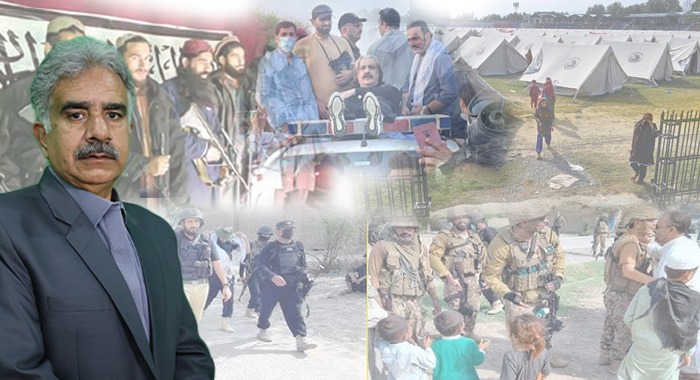The recent targeted operation in Bajaur is not just another security sweep, it is a litmus test for Pakistan’s seriousness in eliminating terrorism, securing its borders, and restoring civilian control in regions long vulnerable to militant influence.
For too long, militants have used our tribal areas; particularly Bajaur, Mohmand, and Khyber, as both a sanctuary and a battlefield. Despite repeated operations, the same groups have reemerged, stronger, more coordinated, and increasingly emboldened by both local cover and international backing.
The question is often raised: How can a few thousand militants continue to evade a state with a massive military, intelligence apparatus, and law enforcement? The answer lies in the very nature of asymmetric warfare.
These militants use local populations as human shields, embed themselves in communities, exploit local sympathies, and operate from within the grey zones of civilian life. They do not confront the state on open battlegrounds, they infiltrate, terrorise, and manipulate.
Many of these groups have multiple backers; foreign intelligence agencies, ideological movements, and global funding networks. They are not just foot soldiers of a lost cause; they are tools in a larger geopolitical game. And sadly, our people; our tribes, our soldiers, our civilians, are paying the price.
Local tribal elders in Bajaur and Khyber gave the militants three clear choices: disarm and integrate, leave the population centres, or exit the region entirely. These options were rejected.
This rejection is telling. It signals not a misunderstanding, but a deliberate refusal to coexist with the writ of the Pakistani state. These groups are not resistance fighters, they are non-state actors openly challenging the Constitution, democracy, and security of the Republic.
If someone truly believes in martyrdom and religious duty, they should fight in the mountains, not hide behind innocent civilians. Their reluctance to do so proves their real aim is not spiritual reward—it is power, control, and survival through manipulation and violence.
Much has been said about the return of militants during past negotiations, especially under the previous government and certain high-ranking officials. But it is simplistic and intellectually dishonest to pin this crisis on a single individual or institution.
Whether it was Imran Khan, General Faiz Hameed, or any other figure, they did not act alone. These were decisions shaped by national policy, geopolitical pressure, and international constraints. Blame must be collective, and so must accountability.
That said, any future policy must be rooted in clarity. The experiment of reintegration without disarmament has failed. No more space should be given to those who reject Pakistan’s laws, institutions, and people.
There is an important shift in the global narrative: Pakistan is no longer being blamed for harboring terrorists. Instead, groups like the BLA, BRA, and TTP are now internationally designated as terrorist organisations. Even the U.S., long sceptical of our role, has acknowledged our sacrifices.
This presents an opportunity Pakistan cannot afford to waste. We have the legitimacy to act; diplomatically, militarily, and morally. And if these militants flee to Afghanistan, then Kabul must be held accountable. Afghanistan cannot preach brotherhood while offering safe haven to enemies of Pakistan.
The Afghan government’s own leadership, including Maulvi Hibatullah, has declared that cross-border militancy is not permissible. If this is true, then Pakistan must press for its enforcement—bilaterally, regionally, and at international forums.
There is no room for mixed messages. Statements from provincial leaders like Ali Amin Gandapur denying involvement or distancing themselves from operations only serve the enemy. The state must speak, and act, with one voice.
Provincial and federal governments are aligned on paper. PDMA resources have been mobilised. Temporary camps for displaced civilians are being built. Schools and hospitals have been allocated. These are important measures, but they are not enough.
Leadership must extend beyond statements. It must translate into coordinated, sustained, and visible action. No more backroom deals. No more appeasement.
What Must Be Done
End the Dual Game: Militants cannot be both partners in peace and targets of war. The state must choose, and the only logical choice is zero tolerance.
Protect the Civilians: Locals caught between militants and military operations must be shielded. Their safety, livelihoods, and dignity are non-negotiable.
Disrupt the Networks: These groups have handlers, sponsors, and sympathisers. Whether inside the country or abroad, their networks must be exposed and dismantled.
Hold the Afghan Government Accountable: If militants regroup across the border, Pakistan must raise the issue on global platforms, with evidence, with urgency.
Develop the Tribal Areas: Peace without prosperity is fragile. If we do not invest in Bajaur, Khyber, and Mohmand now, we will be back here again in five years.
The militants in Bajaur are not just a security threat—they are a challenge to the very soul of Pakistan. They reject our Constitution, our democracy, our values, and our future.
This is not a local problem, it is a national crisis with global implications. China, Russia, Central Asia, the U.S.—all have a stake in the stability of Pakistan. We must rise to the occasion.
This cat-and-mouse game must end. A decisive, principled, and people-centered approach is no longer optional. It is Pakistan’s only path forward.





